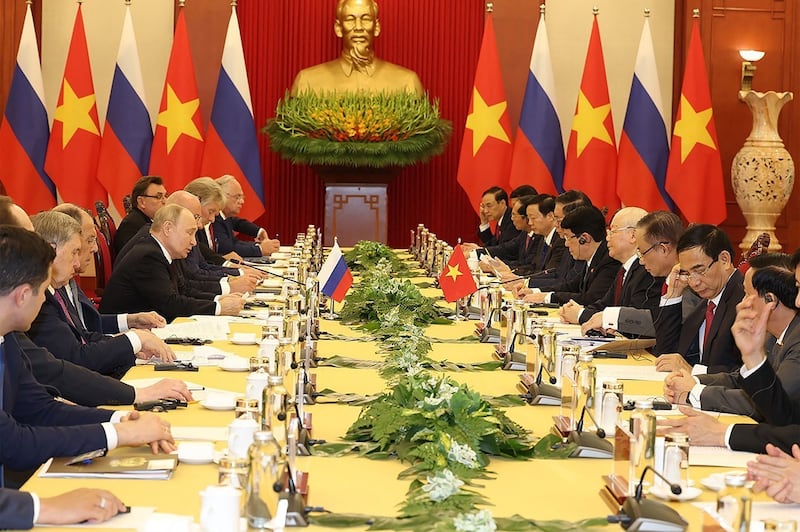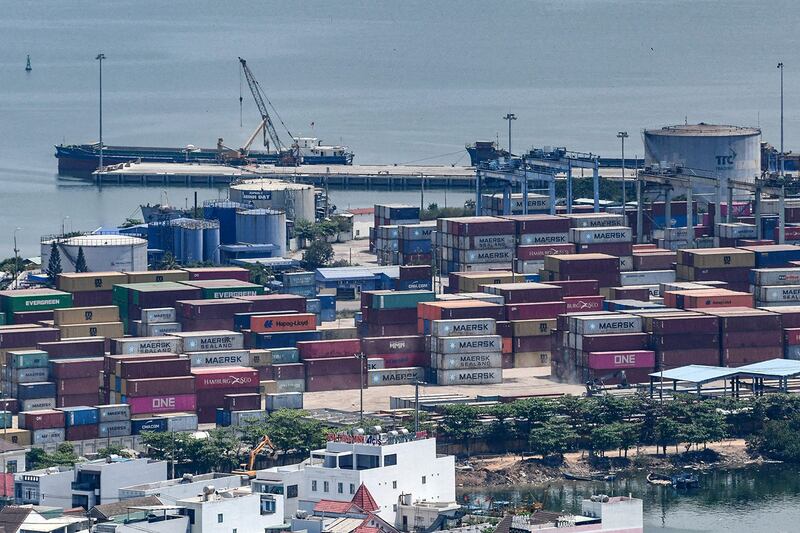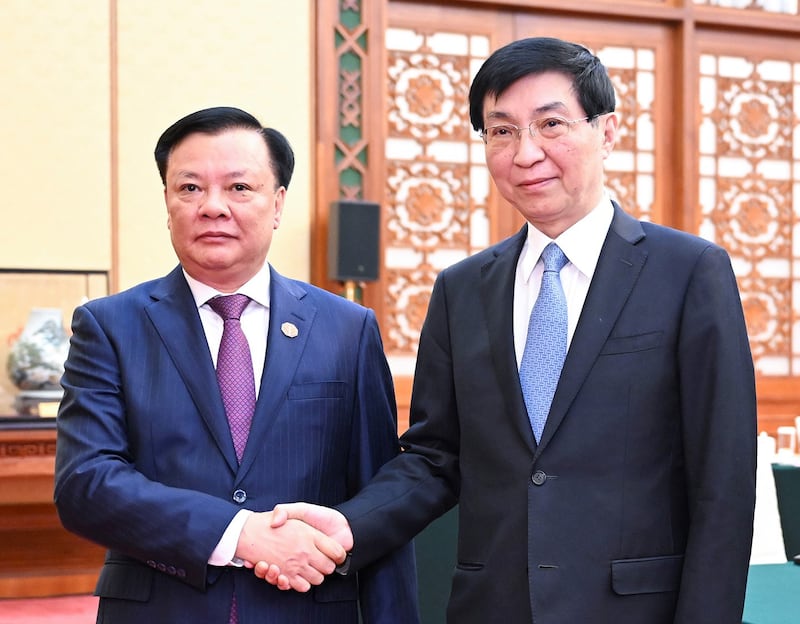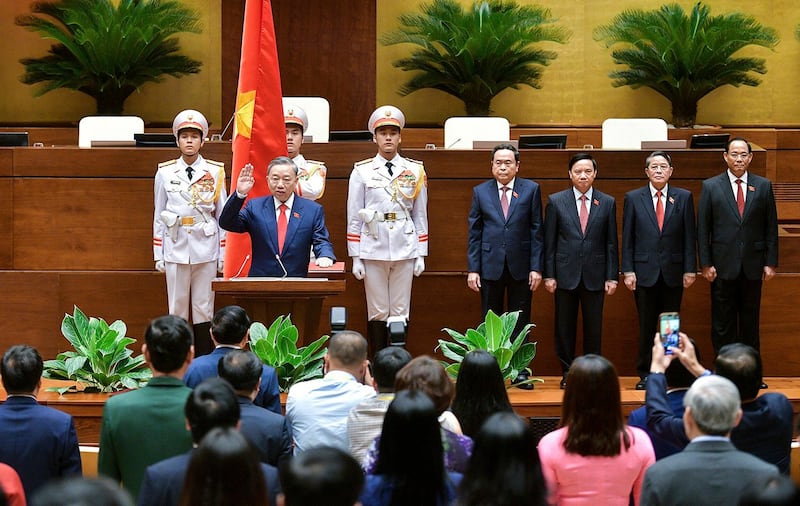Why did Hanoi welcome Vladimir Putin, the Russian president, for a state visit this past week?
Sure, invite him. Allow Russian state media to speculate on a visit. Meet with his underlings. But to actually unfurl the red carpet for a leader whose global travel has been sharply curbed by an International Criminal Court arrest warrant ?
From geopolitical, domestic, economic, and ideological points of view, it makes little sense – unless the rising security faction is dictating what happens within the Communist Party of Vietnam.
Some 15 deals on economic, educational, and political cooperation were signed. But those items could have been agreed upon without Putin's presence. That was the smokescreen, however.

RELATED STORIES
[ Putin visits Vietnam, aiming to renew Cold War tiesOpens in new window ]
[ Vietnam’s fraternal ties with Russia are put to the testOpens in new window ]
[ Bear East: RFA Special report on Russia’s influence in AsiaOpens in new window ]
[ The deepening ‘securitization’ of Vietnamese politicsOpens in new window ]
Russia was the largest provider of military equipment to Vietnam until 2022, but that was before it invaded Ukraine and depleted much of its arsenal.
Sales to Vietnam have tanked since. Nobody should look at how Russian equipment is faring in Ukraine and conclude, “I need some of that.” However, that’s apparently what the Vietnamese military is thinking.
According to a finance ministry document leaked to the media last year, Vietnam thinks it can buy weapons from Russia via payments to a joint Vietnamese and Russian oil venture in Siberia, which would allow it to avoid U.S. sanctions.
Missiles in mind
The New York Times cited a Vietnamese official saying the secret deal will be worth $8 billion over the next two decades. Some reckon this is now Vietnamese government policy, which might explain Putin's visit.
Some observers believe Hanoi wants aircraft and new naval vessels from Russia. Its navy badly needs an upgrade. And it really wants BrahMos cruise missiles developed by a joint Russian and Indian venture.
Beijing has apparently pressured Moscow not to sell to Hanoi. Given that Russia is now utterly dependent on China, it’s unlikely that Moscow would agree to the sale.
Maybe Hanoi thought that by giving Putin some international publicity and support through the visit, Putin would return the favor with missiles. Maybe Hanoi thought it needed Putin to be there in person to drive a hard bargain: “If you don’t give us what we want, we’ll go to South Korea for military equipment.”

But it’s a risky business. It’s hard to imagine the U.S. not responding to any such deal to buy Russian weapons, however cleverly it’s designed to get around sanctions, with very forceful sanctions.
Indeed, it’s hard to imagine this not impacting Vietnam’s economy more generally. The economy isn’t spectacular at the moment, and Hanoi really cannot afford to jeopardize relations with the U.S., its second-largest trade partner and primary export destination.
It certainly cannot afford to do so when Donald Trump, who famously remarked that Vietnam is the “worst abuser” of the U.S. on trade, could soon return to the presidency.
‘Securocrats’ in charge
But this risk-taking may be the consequence of the "securocrats" having taken over the Communist Party of Vietnam, having used party chief Nguyen Phu Trong's signature anti-corruption campaign to purge their rivals over the past 12 months.
Trong, now 80, did not look very well in his meeting with Putin. It’s still uncertain if he’ll make it to the next party congress in early 2026. My guess is that Trong is no longer the arbitrator he seemed to be until very recently.
In this vacuum, the “securocrats” – officials of the security ministry – have quickly forged a stranglehold over the party. After last month’s changes to the Politburo, there are now just two economics-minded technocrats in the 16-member elite decision-making body, the lowest number in decades.

To Lam, the former public security minister and now president, is tipped to become the next party chief.
There is talk that the securocrats aren’t yet finished purging the party of their economic-minded rivals—those who would put up a fight within the party against any major military deal with the Russians.
Dinh Tien Dung, the Hanoi party chief and former finance minister, “resigned” this week and will likely soon exit the Politburo.
It was probably the securocrats who lobbied hard for the Putin visit to happen, silencing those who we know from leaks were dead against it.
Flow of information
The anti-graft campaign has certainly weakened the bureaucracy. Civil servants are so petrified of being reprimanded for potentially making mistakes, especially when it comes to using state money, that they’ve simply stopped making hard choices, leading to a bureaucratic slowdown and major problems in state capacity.
The bigger concern should be whether bureaucratic fear has also impacted the flow of information within the party. Are underlings still willing to give their superiors unwelcome but honest news?
According to Nguyen Khac Giang, of the ISEAS – Yusof Ishak Institute in Singapore, “the new [politburo] leaders…are more ‘thinkers’ than ‘doers,’ lacking significant achievements that justify their promotions. This reinforces the belief that in the uncertain context of the anti-corruption campaign, it is wiser for bureaucrats to play safe by doing less and surviving rather than taking risks.”

Look north of the border and Xi Jinping, China’s paramount leader, has fully centralized power and thoroughly purged anyone competent or honest from the bureaucracy. It’s not that he has surrounded himself with “yes men”; It’s that no one wants to give him information anymore.
The ministries and military have responded, in some instances, by simply stopping collecting data – like on youth unemployment. In other instances, they’ve gone gung-ho on “wolf warrior” diplomacy schemes without telling their superiors.
It has been reported that Xi only found out that China put that spy balloon above the United States in early 2023 after Biden informed him. Some ministry lackey had apparently decided it was a good idea and, with information no longer flowing upwards, took the initiative.
By the time Xi realized what was happening, America had collected so much data on to whom and how the balloon was transmitting data that it was arguably one of the biggest intelligence breakthroughs against China in decades.
In Hanoi for now, the securocrats are in charge, and appear to be listening to their “yes men”.
The danger, looking a few years down the line, is whether the alternative factions become so weak and the entire bureaucracy becomes so fearful that unwelcome news no longer flows to the top.
David Hutt is a research fellow at the Central European Institute of Asian Studies (CEIAS) and the Southeast Asia Columnist at the Diplomat. He writes the Watching Europe In Southeast Asia newsletter. The views expressed here are his own and do not reflect the position of RFA.
